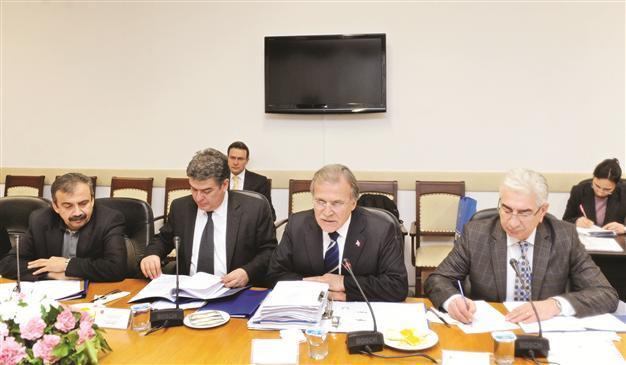Turkish PM’s sincerity test in the new constitution
ANKARA - Hürriyet Daily News

There is harmony in Parliament’s Constitutional Concilation Commission, however, the political situation is tense. AA photo
Through the month of April, the parliamentary Constitution Commission will continue hearing representatives of organizations and establishments that want to contribute. After May 1, most probably in a place quite remote from
Ankara, the commission will start writing the content for the new commission. In contrast with the serial fights and tension in the Parliament, the commission is currently demonstrating unprecedented harmony.
Commission members from the Justice and Development Party (AKP), Republican People’s Party (CHP), Nationalist Movement Party (MHP) and Peace and Democracy Party (BDP), with the culture of conciliation they are exuding, are in fact giving a democracy lesson to Parliament.
The harmony has reached such a point that those members of the MHP and the BDP who generally do not speak to each other outside Parliament have formed personal friendships in the commission. Head of the commission Cemil Çiçek has emphasized this situation, saying: “I wish the harmony here could also exist outside.”
With this statement, Çiçek actually discloses a serious concern of his. Although much harmony exists within the commission, the situation outside is just as disharmonious. The rows between party leaders have reached such dimensions that the bar of “conciliation” was left behind a long time ago. As tension increases, society receives its share of it.
Parliament is beginning yet another stormy week. The 12-year tiered education bill is scheduled for discussion at the general assembly. Anticipation of fights is high. The corridors of Parliament betray the calmness before a storm. The possible unpleasantness between the government and the opposition might endanger the future of the Constitution Commission, and members of the commission are concerned that a fight will infect the process of writing the new charter.
Commission President Çiçek frequently expresses this concern. Çiçek and commission members from the AKP, CHP, MHP and BDP have agreed to make a call to political leaders to better suit the new constitution and keep it outside daily political fights. Commission members will meet leaders and demand that they make statements that better suit the new constitution, clearing the air ahead of the content-writing process starts.
This will be a suitable call, because the commission is working with all its power, but for a long time there have been no significant signs of adaptation from the leaders of the four parties. Prime Minister Recep Tayyip Erdoğan has said almost no word on the new constitution since October 2011. Similarly, Kılıçdaroğlu, Bahçeli and Demirtaş have not mentioned the new constitution for months.
How will the leaders respond to this call? Will they generate a strong emphasis on the new charter before the content-writing?
A member of the commission from one of the opposition parties made this comment: “The CHP, MHP and BDP genuinely want a new constitution. What is important is Prime Minister Erdoğan’s stance, the person who has not said a word on the new constitution since October. Erdoğan’s stance will be a test of sincerity for the government with regards to the future of the new constitution.”
‘Three-term’ scenario at AKP
Those in the ruling Justice and Development Party (AKP) that are concerned about the ban on running for office for the third time, are continuing their search for a formula to solve the issue. The most recent scenario being whispered in the corridors is this: “The CHP has taken the Presidential Election Law to the Constitutional Court. If the high court annuls the law together the length of the term that President Abdullah Gül will serve is five years instead of seven, and the election will have to be held in August this year. If Erdoðan does not wait five years and ascends to Çankaya early, the AKP will convene its congress to both elect its new leader and change its statute, removing the ban. The prominent names will thus be able keep their positions.”
BDP: ‘Öcalan is an interlocutor’
The government, after shelving the “Kurdish initiative,” opted for policies that prioritized security. In the new road map of the government, Öcalan and Kandil can not be considered interlocutors, and processes similar to Oslo will not happen again. The BDP is reacting against this, saying “There is no solution without Öcalan.” The BDP argues a solution can only be achieved by “keeping Öcalan and Kandil as interlocutors.” The BDP will not only defend this position, but will transform it into a chain of actions, including mass demonstrations. They are said to be planning to pressure the AKP government back into a “Kurdish initiative including Öcalan” process, by keeping alive and active national and international public interest.
Turkey,
